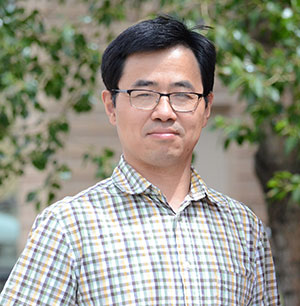UW’s Zhai Explores Bioresources and Bioproducts with Carbon Capture and Storage
Published August 28, 2025

Haibo Zhai
Haibo Zhai, the Roy and Caryl Cline Distinguished Chair in Engineering and a College of Engineering and Physical Sciences professor at the University of Wyoming, published a new study exploring the roles of bioenergy with carbon capture and storage (BECCS) in achieving carbon neutrality -- and making diverse recommendations for sustainable BECCS deployment.
The mini-review, published in the Journal of Bioresources and Bioproducts, details how BECCS can produce energy in a sustainable manner while simultaneously removing greenhouse gases from the atmosphere, offering a promising path for hard-to-abate industries.
Zhai, who also serves as an adjunct professor in the School of Energy Resources (SER), has extensive expertise in the areas of carbon management related to fossil fuels and clean hydrogen production. At UW, he leads an interdisciplinary laboratory that promotes a long-term vision for the role of both technology and policy to cope with complex energy, environmental and natural resource challenges.
Intended to provide a focused summary and contextualize existing research in the emerging field for researchers, policymakers and industry leaders, the article focuses on the ways in which BECCS can assist industries such as hydrogen, steel and cement production -- which are notoriously challenging to decarbonize -- and points to existing peer-reviewed research integrating bioresources with carbon capture and storge in areas of coal-based energy production for deep decarbonization.
The review also highlights that BECCS can be utilized to produce clean hydrogen, emphasizing the need for a comprehensive approach to implementing BECCS. While the technology offers immense potential, its deployment faces challenges, including resource availability, land and water use, cost and public acceptance.
“In this study, I highlight several key roles of BECCS in a net-zero energy future and explore a range of approaches for sustainable BECCS deployment that involve biomass supply chain planning, multicriteria decision-making, carbon capture and storage-related research and development, economic and policy incentives, and public education,” Zhai says.
To ensure the successful and sustainable deployment of BECCS, the review concludes with an array of recommendations. It stresses the need for multidimensional coordination from technical, economic, environmental, policy and social perspectives to navigate potential trade-offs and ensure long-term viability.
To read the mini-review and access cited research within the piece, visit: www.sciencedirect.com/science/article/pii/S2369969825000428?via%3Dihub.

